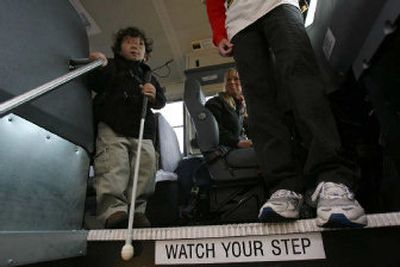Finding a new way

SEATTLE – At age 3, Muhammed “Hamoody” Hussein, blinded by gunfire in Iraq, is learning to navigate a new world of darkness an ocean away from his home and family.
Holding a white cane in front of him, Hamoody can detect shapes in the perpetual darkness – a wagon with toys, other students, a turn in the school hallway, an elevator door.
“This is the elevator,” says Elizabeth Williams, his school aide, indicating a hollow sound. “Hear the difference?”
The hope is that his injury can be reduced to a “physical inconvenience” rather than a disability. The little boy, shot in the face, could find his way in a new world illuminated by his cane, Braille and his remaining senses of touch, hearing, smell and taste.
There have been many small victories since Hamoody was brought to the United States in May by a nonprofit agency that put him in touch with volunteer doctors.
His medical problems turned out to be far more severe than doctors first predicted, but he has settled into life with his hosts, Randy and Julie Robinett Smith, of Snohomish, becoming fluent in English, attending preschool, playing soccer and making friends. He also has developed a love for books in Braille.
It’s not clear when he’ll return to his family in Iraq, where there are no accommodations for blind children.
“We talk a lot about (him) going back to Iraq,” Julie Robinett Smith says. “I tell him to remember that no matter what anyone says to him to always remember that auntie says he’s smart and handsome.”
‘I went up to heaven’
Hamoody was brought here by Healing the Children, which lines up hospitals and doctors who donate their services for children in need of care that is not available where they live. His uncle, Adil Joda, contacted the agency.
Hamoody, a Shiite, was shot in the face by Sunni militants while riding in a car outside Baghdad in May 2005. An uncle died in the attack. His mother and another relative were injured.
The bullet that struck Hamoody shattered his right eye and damaged the left one. A thick scar left mounds of flesh on his forehead and an indentation instead of a nose.
Eye surgeons in Seattle determined little could be done to restore his vision but are preparing to begin repairing his damaged face and sinuses. The first of many surgeries will involve bone grafts to correct severe sleep apnea from the sinus damage, which robs the little boy of rest and distorts his speech.
“He talks about what happened to him,” Smith says. He mimics the sound of gunfire and tells her that after the shooting it was dark.
“I was all covered in water (blood), and I went up to heaven and came back down,” he says.
Between trips to the doctors, Hamoody started attending a special preschool for children with disabilities last month at the Snohomish School District’s Central Primary Center. He joined eight other students in the half-day program, learning to improve mobility and develop independence.
When he arrives on the school bus, Williams coaches him on how to use his cane to get down the aisle and the vehicle’s steep stairs.
“Swish, swish, tap, tap,” she says. “Keep the cane in front of you. You don’t need to know what’s in back.”
“Follow the trail,” Williams tells him as he enters the school. He places a hand on a wall and follows it down the hallway instead of wandering around by himself.
These lessons make it easier for him to focus on learning when he reaches kindergarten, says Michelle Cormier, one of Hamoody’s teachers.
“He’s just so smart. He picks up on concepts so fast,” Cormier says.
‘Cane is the key’
No one knows how long he will be here because each visit to a doctor seems to turn up a new problem.
When he returns to Iraq, he will be unable to attend school – there are none for training blind students – and likely will not be able to hold a job.
“The lack of training in this child’s home country will be difficult to overcome, but the society’s view of blindness is more difficult to overcome,” says Mark Riccobono, director of education for the National Federation of the Blind. “This means that at every turn, the child will get the message that blindness is a barrier to his success.”
With early training and today’s technological advances, there’s no reason blindness should be considered anything more than a “physical inconvenience,” Riccobono says.
“Early use of the long white cane is setting this young man on the road to success from step one,” he says. “The long white cane is the key to independent movement and travel.”